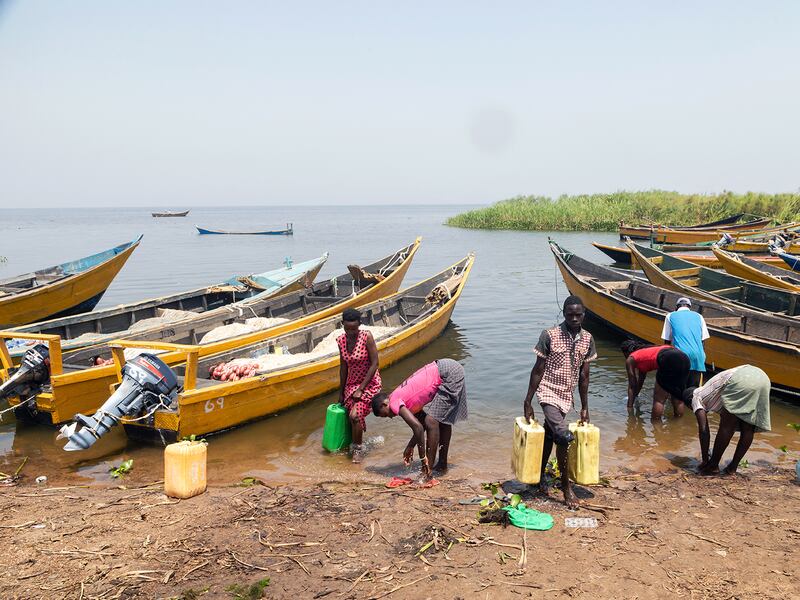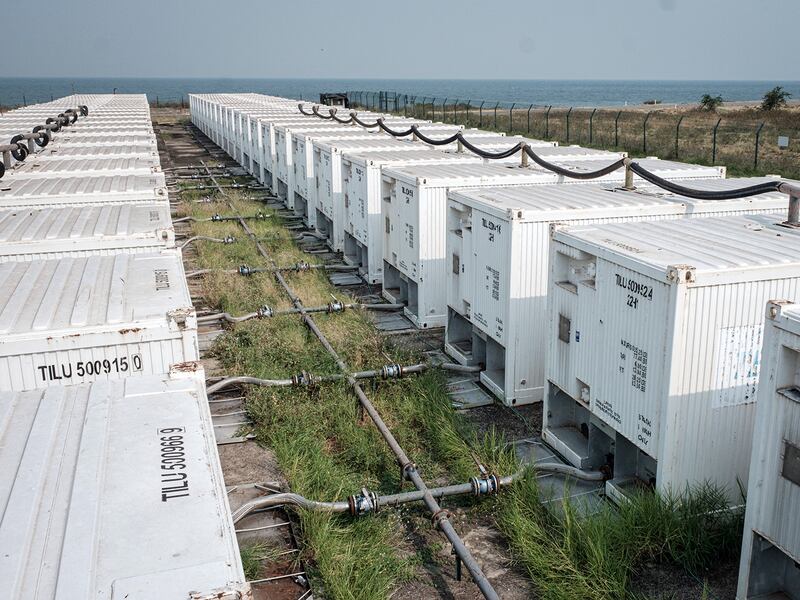A US$10-billion oil project in Uganda being developed by France’s TotalEnergies and CNOOC of China has been linked to human rights violations, with rights groups accusing the local authorities of repression and forced evictions, and citing sexual violence and environmental damage in connection with the project.
The project forms a key part of Chinese President Xi Jinping’s signature Belt and Road global supply chain and infrastructure program, which China says has helped more than 150 countries develop seaports, railways and bridges, and critics say has led to growing geopolitical influence for Beijing and debt traps for its partner countries.
Championed by Uganda’s strongman President Yoweri Museveni, despite ongoing opposition from environmentalists, the Ugandan project involves drilling for oil in the northwestern Lake Albert region and building a 1,443-kilometer (900-mile) heated pipeline to ship the crude to Tanzania’s Indian Ocean port of Tanga.
According to a recent report by the International Federation for Human Rights, or FIDH, Civic Response on Environment and Development and Lawyers Without Borders, the project has been associated with “disproportionate security measures, repression, land rights violations, forced evictions and corruption.”
The report accuses Ugandan troops of beating and harassing fishing communities, and documents cases of sexual and gender-based violence committed by soldiers and company personnel.
Some 12,000 families have been displaced to make way for the pipeline, while hundreds of households around Lake Albert have also been forced to leave their homes, it said.
The most serious abuses took place in and around the Kingfisher oil fields, the report said, noting a “high level of fear” in the region.
RELATED STORIES
EXPLAINED: What is the China-Africa summit and why does it matter?
China’s president pledges $50 billion to fund African development
Illegal Chinese fishing off East Africa hurts local communities: report
Meanwhile, non-government groups have reported house break-ins, beatings, unlawful detentions and torture, with at least 96 activists arrested between May and early December after they opposed the project, it said.
“Having displaced thousands of people, oil development is now significantly transforming the realities of local communities,” Sacha Feierabend, FIDH’s Senior Researcher on business and human rights, said in a statement launching the report.
Construction works, high inflation, pressure on land, deployment of security forces, and influx of workers have a considerable, combined impact on human rights, he said.
He called on all companies, the Uganda authorities and other stakeholders to assess their involvement in human rights abuses.
The army has reportedly carried out repeated arrests, extortion, and blatant mistreatment of community members to enforce restrictions on fishing, crippling the main source of livelihood in the area and instilling fear among residents, the rights groups said, citing eyewitness testimonies of hundreds of people being “evicted at gunpoint.”
The report said CNOOC, as the operator of Kingfisher, had a “distinct responsibility,” yet was taking no action to address “serious violations on its doorstep.”
It said TotalEnergies, as the main investor in all the projects including Kingfisher, had “failed to uphold its human rights duty to conduct effective due diligence.”
Sexual exploitation and gender-based violence are also on the rise in the project area, with growing prostitution near Kingfisher and Tilenga, the report found, adding that women are being excluded from work on the project itself.
Andrew Bogrand, Senior Policy Advisor at Oxfam, called on TotalEnergies to strengthen its human rights policies and ensure they are “better enforced” among its partners on the project.
“This report reveals how human rights risks flagged in previous years are turning into real violations, especially against human rights defenders,” Bogrand warned.
Government and companies respond
Ugandan government spokesman Chris Baryomunsi said the allegations were “rather ridiculous and unfounded,” and a “smear campaign” that wouldn’t succeed in halting the project, Agence France-Presse reported.
TotalEnergies expressed its “strongest disagreement” with the claims in the report “that cast doubt on the attention paid to respect for human rights in operations in Uganda,” the agency said.
“In Uganda, as elsewhere, TotalEnergies is transparent about its human rights commitments and their implementation, which have been the subject of numerous public communications,” it added.

CNOOC has yet to comment publicly on the report, but took part in a joint consultation on similar allegations from Just Finance International, according to a company response posted to the Business Human Rights website, that found “no connection” between recent human rights allegations and the activities of the Kingfisher operations in the project area.
The June 10 response from TotalEnergies said the Ugandan military hadn’t carried out any enforcement operations for the project, and “the allegations of physical displacement seem not connected to the Kingfisher project.”
CNOOC’s official website defines non-government groups and local communities as “stakeholders” in its projects.
“We believe respecting human rights is a fundamental aspect of responsible energy development,” according to the Corporate Social Responsibility section of its website.
“We strive to ensure business decisions are examined for their potential impact on human rights and by taking steps to ensure employees and contractors are never complicit in human rights violations,” according to the website.
Policy of non-interference
David Hamilton Shinn, adjunct professor at the School of International Affairs at George Washington University and former U.S. ambassador to Burkina Faso and Ethiopia, said CNOOC likely sees any local human rights violations as the Ugandan government’s problem.
He said the state-owned offshore exploration and development giant had likely adopted the Chinese government’s own approach of non-interference in the “internal affairs” of other countries.

Lin Kunda, an assistant professor of international affairs at the Georgia Institute of Technology, said many of China’s Belt and Road projects take place in authoritarian regimes, where it’s far harder for local people to hold their own government to account.
“This is ... all about Beijing’s relationship with Uganda’s rulers, who are also profiting from this project,” Lin said. “China doesn’t care about its reputation in Uganda because people there have no way to complain to the government.”
Yet China’s Belt and Road cooperation model has been popular among developing countries where political instability is a concern for Western competitors, because its state-owned enterprises are able to offer technology and funding in the form of cheap loans.
“Chinese state-owned enterprises hunt in packs, and so others will come in to set up factories to refine raw materials, and transport [the products] back to China too,” Lin said. “This one-stop shop approach is very attractive.”
Lin said Beijing is still keen to diversify its energy sources, particularly since the war in Ukraine started.
“They can’t guarantee that their relationship with Russia will always be plain sailing,” Lin said. “I don’t think China will give up its efforts to expand its energy sources via the Belt and Road.”
Translated by Luisetta Mudie.
